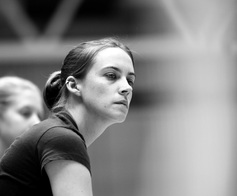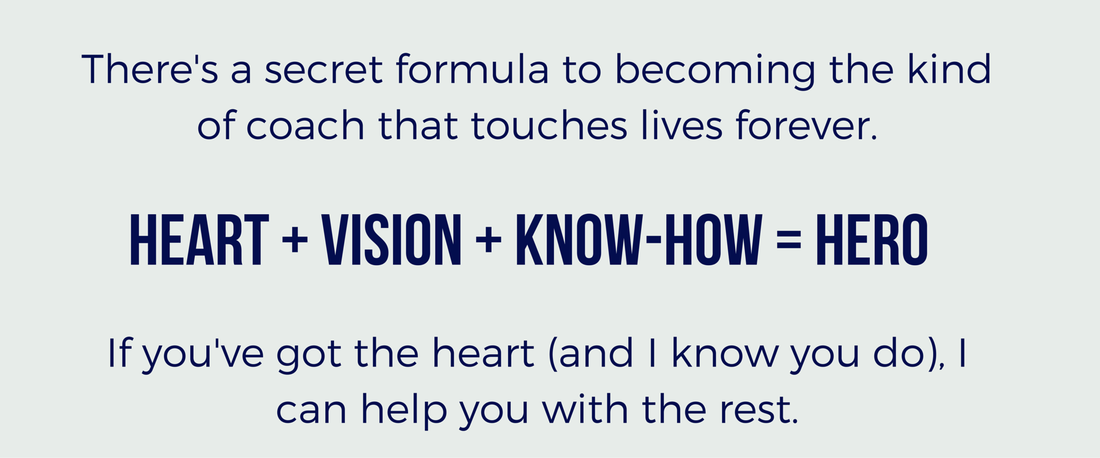
It's great to have Coaching Conversations return after a bit of a break, this time meeting Vanessa Keenan. Vanessa is a Synchronised Swimming Coach based in Canada and was last year named on the CoachSeek Top 50 Influential Coaches for 2015. You can find more of her work at her website, The Online Synchro Coach, or her YouTube channel.
While I was still competing I started taking coaching and judging courses. I also started to fill in for other coaches when they needed someone.
Having performed to a high level, how did you find the transition from athlete to coach?
For me it was easy, but I think I always knew deep down that I wanted to coach. When I swam I always would be trying to figure out the why. Knowing the why really helped me once I was in charge of a group. I think knowing I wanted to coach made me more aware of everything going on around me while I competed. I was curious about everything so it wasn’t as big of a surprise for me when it was my turn.
How do you think your athletes would describe you as a coach?
I think they would describe me as an athlete’s coach, organized, very technical, knowledgeable, bad at knowing the counts of the routine and goofy!
What are the key elements that you consider when planning a session or meeting with athletes?
I make sure that I plan my sessions to have purpose and that they run effectively. Every drill, warm-up, correction, . . . has to relate back to what the goals for the season are and the goals of the current cycle we are in. In terms of effectiveness, I plan what equipment I need, when I will use the video, when we will watch it and even where in the pool we will go. If I am meeting athletes I always take time to plan out what I want to say and what I want to ask. I really value planning. It helps guide what I am doing.
Your website has the phrase "Coaching with Purpose", what does this mean to you?
I think I alluded to it above, but I make sure that when I am at the pool we are practicing with purpose and I am consciously coaching. I often hear corrections like, “that was better, that was good, not like that”. I strive to give specific feedback on how athletes can fix errors and more importantly I give them specific feedback on what they did well. I am not a fan of doing something because our sport has always done it that way. I need to know the why and the why needs to be worth it. As coaches we are in charge of helping athletes realize their goals and dreams so I take every moment I have to make sure I help them out the best I possibly can. Hence coaching with purpose.
What do you think has made you the coach you are today? Furthermore, what has informed the way you see coaching as a profession?
I was fortunate as a young athlete to have many great physical education teachers and coaches. As I got older I started to see the not so good ones too. Between the contrasts of the two I learned what to do and what not to do. I always knew I loved sport and synchro so when I ran into people who seemed to be trying to wreck that for me I made mental notes of why that was wrong and I would laugh inside.
Beyond that I had some great mentors at the University of Alberta. Dr. Vicki Harber and Dr. Dru Marshall had high expectations of us students and they themselves pushed excellence in all they did, so it was quite motivating and encouraging to be surrounded daily by women like them.
I think having such strong role models at University made me realize that coaching is not something that just happens. My mentors pushed us hard to be professionals in academia and in our coaching. They strove for excellence so we did too.
Since starting coaching, what have been the most important lessons you've learned? And what do you do differently now compared to when you started out?
- Do it now- if something is not working why wait to change it. I used to wait until there was a good time to change something. Now I am not afraid to change things if I truly believe it will make things better. It could be choreography, a position a swimmer is in, perhaps an aspect of training. There will never be a perfect time and prolonging make the change is holding the team back.
- Let it Go - Get your ego out of the way. In synchro, it is often the coach who picks the teams music and does all the choreography. When I was a younger coach it was difficult for me to accept judges comments, scores, feedback and even results. Over time I began to realize that I was too attached to my routines and that I needed to detach from them so I could make the best decisions for the team and the routine. I started asking better questions like what will help me routine score higher? What makes my swimmers look their best? Instead of questions like Why do the judges always rank me lower than team X? Once I let go of ME I was able to taking my coaching to a higher level. Coaching is not about the coach.
What courses/CPD/workshops are available to you to improve your coaching? Do you rate the coach development opportunities available within Synchro?
In Canada we have a NCCP (National Coaching Certification Program) that spans all levels. Beyond that there are some great programs at university you can.
I wish there were more accessible formal synchro opportunities so I could learn from coaches I may never have access to.
I enjoyed your blog "Get Swimmers to Swim Sharper", particularly talking about the four pillars of Video, Competition, Words and Equipment. You mentioned the inter-team competition to see who can perform the routine sharper, definitely an idea I want to adapt to apply with my rugby side coaching. You also mentioned the importance of painting the picture - do analogies play an important role within your coaching?
I think as coaches we need to try as many ways as possible to get our message through to our athletes. Our brain loves images so the more we can “paint the picture” for the athlete the better the athletes can understand and potentially remember. And we want to paint the picture of what we want not of what we do not want. I think athletes have a really good idea of what things shouldn’t look like and may not be as clear on how it should look.
The previous blog, and also "4 Words to Avoid", reference coaching language - are you very conscious about the type of language you used to help frame the learning environment to develop your athletes?
I am always trying to find news way to help my athletes thrive. I noticed that language played an important role. In the blog you referenced I was having my athletes use their body in the opposite way that I intended. Synchro should be effortless, but a word like squeeze does not infer easy. This relates back to coaching with purpose. As coaches we need to make sure what we are saying is helping. Sometimes we are our own worst enemy.
Much of my coaching and playing experience has been with invasion games where the opposition play an active role and individuals can sometimes find a 'hiding place' should they choose to. Synchro is much more focused on individuals managing to connect with their team to perform a routine. Is this a fair summation? If so, how do you coach your athletes to deal with the extra pressure that comes with not being able to hide behind others?
That is true and false. Great coaches can hide the weaknesses of their swimmers by the choreography they choose. Sometimes we can hide swimmers by where they are placed in a formation.
Synchro swimmers train endlessly on their routines so by the major competitions they can perform on autopilot. The high number of repetition helps to build confidence in themselves and the team. I use lots imagery to help swimmers see themselves doing the routine correctly. We do something called landdrill, which is essential the routine on land done with arms only. This can train the synchronization and patterns of the routine without the full load of performing in the water. I also think having faith in your athletes can go along way. Regardless of the athlete we can ALWAYS find something they do well.
Is it essential for teammates to get on with each other outside of the pool too?
Great question. I am torn on this. It sure makes the season more enjoyable if they do. I think ultimately there needs to be a high level of respect and trust for each other. Like a sense that a teammate will do whatever they need to (ethically and legally) to help the team succeed and that it will be reciprocated. I think this is where everyone working towards a common goal is important and that there is buy in from everyone. Personally some of the most successful teams I swam on did well because we all wanted to win and we were not pals after practice.
What triggered your decision to establish the website? Was there anything in particular that you were seeing among coaches or athletes that you wanted to try and influence, in a positive way, with your website?
There were a few reasons I started my website. One of the major reasons was that I had my first child and by the time I had my second I found it too challenging to coach and be mom. Blogging helped me share what I have learned in synchro with others and it let me continue what I love from home.
I also saw a need for coaches and athletes that are more rural to have access to more information. At the time I started there was limited information out there. It is getting better.
The more I blog the more excited I get by the kind words I receive from people all over the world that have found my blog helpful. I also enjoy meeting new people and learning new things. I have met lots of people I would have never met otherwise if it were not for blogging. I am truly grateful that I have an audience that I can share with.


 RSS Feed
RSS Feed
